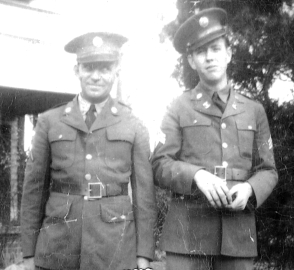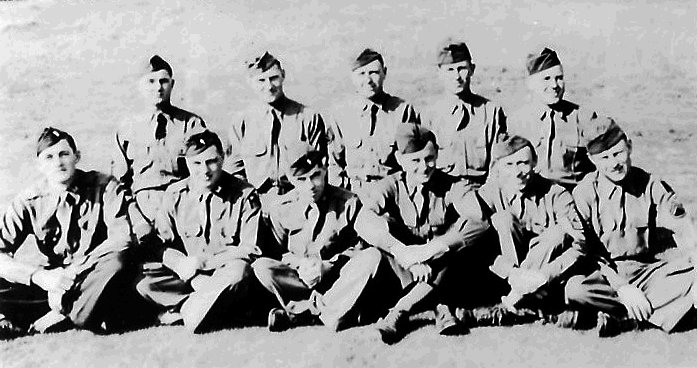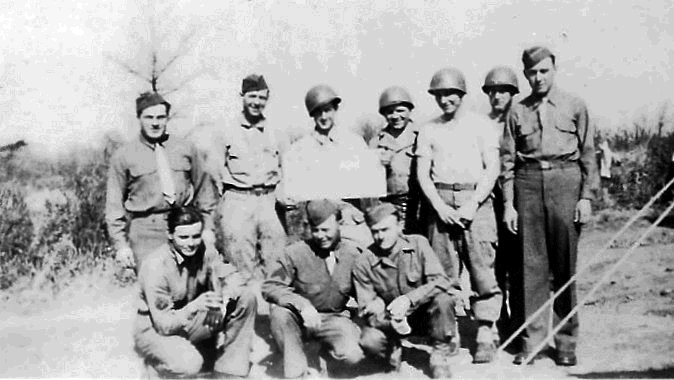

John White was assigned first to the 1st Battalion, 20th Engineer Regiment, then subsequently to the 20th Engineer Combat Battalion. This is a photo of John White and his brother, Bill White, in 1942, before John White sailed with the 20th Engineers to Casablanca.

Here are a couple of photos from his service. White appears in the first photo in back row, center; in the second photo, he is back row, second from the left.


The following article is from the McKinney Courier Gazette, Sunday, June 5, 1994, "D-DAY REMEMBRANCE - - McKinney Resident Recalls Sights of Beach Invasion," by Glenda M. Locke.
He was there. On the beach. With the dead bodies of American soldiers floating around him as a battle raged that would change the course of world history. McKinney resident John White was at Omaha Beach in Normandy as the Allied invasion, code named D-Day dawned. It was a day of sights and sounds that will never leave him.
He joined the Army engineers in 1940 and for one reason and one reason only, he said. "I felt there was a war coming on and I wanted the training to be able to help my country," White, now 74, said.
The prophecy soon came to life-on Dec. 7, 1941, at Pearl Harbor in Hawaii. White was stationed in charge of quarters in Georgia on that sunny Sunday morning that changed the course of history. He heard of the bombing on the radio and knew that the war he had anticipated was at hand.
"It was exactly what I was expecting," White said.
After almost a year of shipping from post to post all over the country, White left the U.S. for Casablanca in North Africa. Although the war was far away from the hot days and cool nights of the desert city, White said he was aware of how serious the situation was becoming. Especially after he was sent to Sicily and the Anzio beachhead in Italy in January 1944.
"We thought this was going to be it- the big battle- and the officers knew something was up," White said.
The battle at Anzio was a bloody pitched battle that was merely a prelude to what was coming. The final tally of Americans who died in 1943 and 1944 in the mud of mountains and freezing weather of the Italian Campaign is 7,862.
While said when he shipped out of Sicily, he was sure he was going home, but when the carriers crept closer to Scotland, he had an inkling of what was going on. "Right then I thought, this is it-this is going to be something big," he said.
When he was sent to Dover and saw the massive build up of troops, he said he knew an invasion was imminent. As the sergeant in charge of the trucks, White left Dover with the carrier full of trucks and headed across the English Channel to Omaha Beach under the cover of darkness before midnight on June 5, 1944.
"I knew there was going to be an invasion-a big one- and I was worried for the ground troops. Everybody understood this was the make it or break it for the war," White said.
White said as the first wave of the 40,000 Allied troops hit the beach, he was ordered to bring the trucks in. "As we pulled up on the beach, there were dead bodies floating all around us in the water and washing up on the beach. We had to get off the carrier with the dead bodies around us," White recalled. "There was this one kid with me-a kind of picky kid-who said he didn't want to get out there with all those dead soldiers and I told him he better or he would be dead out there with them."
History accounts now say that the day went badly almost from the start. Thousands of troops weighed down with heavy equipment either drowned or were shot down by Germans strategically positioned on the cliffs above the beach. One U.S. Army lieutenant wrote in a letter that D-Day was "a nightmare I should prefer to forget."
White started to inch one of the Army trucks up away from the beach when he was stopped by an infantryman whose words sent a chill up his spine. "He told me the Germans were just 300 feet away-just over there," White recalled. "I asked him if the road had been picked for land mines and he said no, but I knew those guys had to have the trucks so I took off."
The noise was deafening, he said. The German artillery whined overhead and shells rained down within feet of this truck. "I looked up and saw the Air Force planes above me and I said, "Go get them, boys."
By the time the battle on the Normandy beaches was over, 4,617 young men would lose their lives-2,200 of them on Omaha Beach.
"I always felt like we would win," White said of that long, long day, "but I didn't know how much it was going to cost us. Seeing all those dead bodies around me made me do some real hard thinking. I looked around me and thought there sure are a lot of families who are going to get a Dear John letter."
White's assessment was correct. The tiny town of Bedford, Va., lost 23 of its 35 soldiers in one company. Nineteen of them died in the invasion's first 15 minutes. But it was days-weeks-before the folks back home learned of the heart-rending casualties.
In the days since that cataclysmic day so long ago, the country had moved steadily forward-in many ways away from the sacrifices made on the beach. White has never thought of himself as a hero, he said, and admitted that he has misplaced his coveted Bronze Star awarded to him for his actions during the war.
"Certain people take what happened on that day for granted-people that aren't old enough to remember it, but most people appreciate our veterans," White said. "I know I appreciate our country, after seeing all the other countries I saw back then and the men who died for this country."